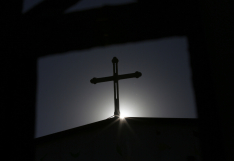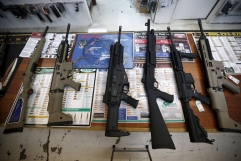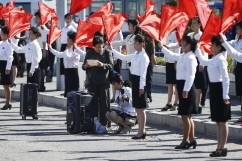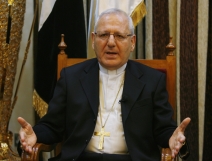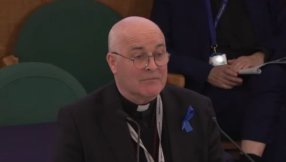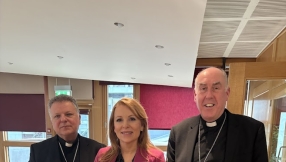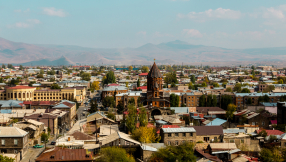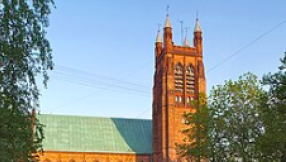Christian persecution has dominated the news over the past year. From the escalating chaos in the Middle East to the crackdown on churches in China's Zhejiang province, it's been a terrible year for some of the world's most persecuted minorities.
"The level of persecution globally is at horrifying levels," Dr Katrina Lantos Swett, Commissioner for the US Commission on International Religious Freedom (USCIRF), told Christian Today. "It quite frankly stuns me that there has not been more outcry internationally amongst political leaders, opinion makers and most importantly on the part of ordinary Christians."
Every repressive government or ideological group is threatened "above all by sincere religious faith, belief and conviction," Lantos Swett said.
"People of faith represent the ultimate challenge to authoritarian regimes, because they freely proclaim they have allegiances more important than those of the nation state, and are very often willing to suffer the consequences of fidelity to their faith. That's the most terrifying thing to repressive regimes.
"And of course, on the flip side of that, we see that when we have extremist religious theologies in the form of groups like ISIL, who attempt to impose their religious doctrine and rules on those who disagree with them, their brutality equals and exceeds even the most grave secular dictators. So people of sincere and genuine faith and conviction find themselves on the receiving end of terrible persecution from vicious secular dictators, and truly vicious religious oppressors like ISIS."
With that in mind, we've brought together some of the stories that have stood out over the past year.
North Korea
North Korea has consistently been named the worst country in the world to be a Christian. Under dictator Kim Jong-un, the government maintains absolute control through the systematic repression of its citizens. According to a recent report by Aid to the Church in Need, of the 400,000-500,000 Christian population in North Korea, at least 50,000 are thought to be labouring in concentration camps, while tens of thousands of citizens, including many Christians, have defected to countries such as neighbouring South Korea, China, Mongolia and Russia.
There had been some speculation that North Korea was opening up after a number of religious delegates from South Korea were allowed to cross the border on official visits towards the end of the year. The Catholic Bishops' Conference of Korea announced in December that yearly services will be held at Changchung Cathedral in Pyongyang on major Catholic feasts.
However, earlier this month, 60-year-old Canadian pastor Hyeon Soo Lim was sentenced to life in prison and hard labour after being charged with 'crimes against the state' by a North Korean court. He had been taking part in a humanitarian mission to support a nursing home and orphanage when he was arrested in February. His family said his trips to North Korea – of which he had undertaken more than 100 since 1997 – were never politically motivated, but the government does not tolerate any missionary or religious activity deemed to threaten the state's supremacy.
In July, Lim 'confessed' during a news conference that that his humanitarian work had been a cover, and he had actually been using his trips to North Korea to gather information. He said he used this information in sermons outside the country in an attempt to drive the regime to a collapse "with the love of God".
Lim's situation is "emblematic of what's been happening in North Korea for a long time," Lantos Swett told Christian Today. "We need to recognise that North Korea is one of the worst black holes when comes to human rights in the world today. It remains something of a prison nation state in which religious believers, and disproportionately Christian religious believers, are horrifically persecuted by the state."
"It's a terrible, heartbreaking situation," she added. "And we very much believe that the world needs to step up its historically weak effort at shining the brightest of lights on the dark story [of North Korea], and bringing much greater pressure to bear."
North Korea has previously sentenced Korean-American missionary, Kenneth Bae, to 15 years of hard labour but released him early in 2014. Jeffrey Fowle, an American citizen, was arrested and accused of leaving a Bible in a club for foreign sailors in the northern city of Chongjin. He was released in October last year.
China
China has been accused of a severe crackdown on churches, most significantly in the eastern coastal province of Zhejiang, where up to 1,700 churches have been demolished or had their crosses removed since late 2017.
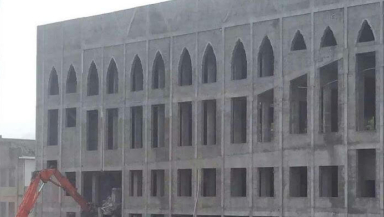
This has intensified over the past year, and activists have blamed president Xi Jinping for introducing hard-line policies in various parts of civil society, particularly religion. China last year announced plans to introduce its own brand of national theology and in May 2015, Xi called for a curbing of outside influences. "We must manage religious affairs in accordance with the law and adhere to the principle of independence to run religious groups on our own accord," he said at a top-level government meeting. "Active efforts should be made to incorporate religions into socialist society."
Of particular concern this year has been the crackdown on human rights lawyers. More human rights defenders have been detained or are missing under two years of Xi's leadership than in the previous two decades. Many of them worked on behalf of churches targeted by the demolition campaign.
At least 10 detainees in Zhejiang remain in so-called 'black jails', which have no legal status, and in which torture is common. Among them is Christian lawyer Zhang Kai, who has been missing since his arrest in August. He had represented more than 100 churches fighting orders to remove their crosses, and had written and distributed a 'Cross Activists Handbook' advising church leaders on how they can use China's own constitution – which guarantees religious freedom – to defend their rights.
"I've made up my mind: the most they can do is jail me. But if I stay silent, I'll regret it my whole life," he allegedly told friends ahead of his arrest.
Middle East
As Islamic State tightens its grip in Iraq and Syria, more stories of brutal persecution have emerged over the past year. One year on from the capture of the northern Iraqi city, a priest who was forced to flee Mosul warned in September that the suffering continues for Christians in the Middle East. "The world is losing Christians from Iraq. That is a big loss for humanitarian heritage," Father Behnam Benoka said.
"We left everything, we lost everything that we had."
In February, more than 200 Assyrian Christians were abducted by ISIS militants from villages along the Khabour River in northern Syria. More than 135 hostages have now been released, but in October, militants released a video showing the execution three of the hostages and threatened to murder those still in captivity if a multi-million dollar ransom was not paid.
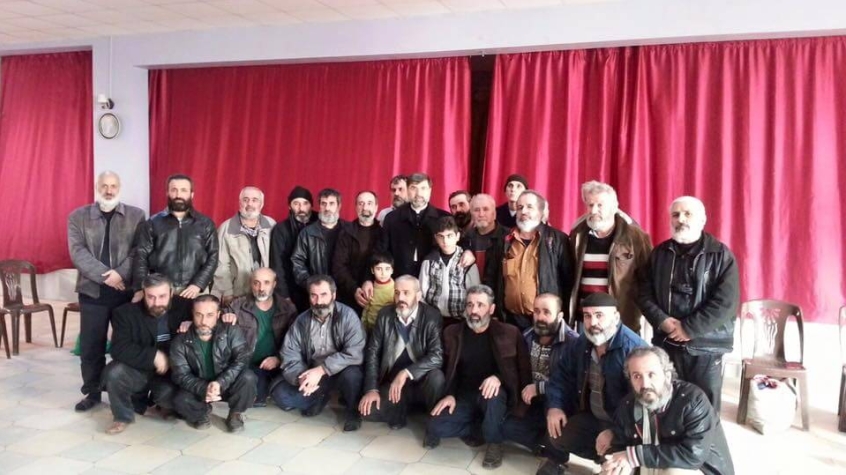
There have been repeated calls for the targeted killing of Christians in Iraq and Syria under Islamic State to be named genocide, the latest of which came from the USCIRF. On December 7, it said groups systematically persecuted by ISIS – which include Christians, Yazidis, Shi'as, Turkmen and Shabaks – should be recognised as victims of genocide.
"The hallmark of genocide is the intent to destroy a national, racial, ethnic, or religious group, in whole or in part," said vice-chairman Robert George. "ISIL's intent to destroy religious groups that do not subscribe to its extremist ideology in the areas in Iraq and Syria that it controls, or seeks to control, is evident in not only its barbarous acts, but also its own propaganda."
Lantos Swett echoed George's statement. "The blazing hot focus of truly existential threats against minority Christian communities would have to be the Middle East," she said.
ISIS has "engaged in the most horrific and barbaric acts directed against Christian communities: murder, rape, torture, enslavement and forced conversion under threat of death...They have made it very clear they want to convert, kill or drive away all Christians from their self-proclaimed Islamic State, so we feel quite strongly there is a case [for genocide]."
Indonesia
It emerged in November that around 1,000 churches have been closed down in the Indonesian region of Aceh since 2006, as part of a wider crackdown on minority faiths. A law was implemented nine years ago, supposedly with the aim of promoting religious harmony, but in practice it requires non-Muslims to obtain 60 signatures from people of a different faith as well as permission from the local authority before they can build a place of worship.
In October, Reuters reported that several churches had been destroyed after Muslim residents, including members of the hardline group Islamic Defenders Front, had demanded they be shut down. According to a report by the Gatestone Institute, hundreds of Muslims torched churches in Sharia-law governmed Aceh, and an estimated 8,000 Christians were displace by the violence in the region.
Police in one district allegedly used sledgehammers and axes to tear down the churches.
Mexico
The body of the 11th priest to be murdered in Mexico since 2013 was found in November, amid a troubling rise in religious discrimination. Father Erasmo was a priest in the town of Cuyuaco, Puebla, in south-eastern Mexico. His body was found on an isolated country road several days after he was reported missing, with burn marks and evidence that he had sustained head injuries.
Christian Solidarity Worldwide (CSW) earlier this year accused the government of failing to uphold constitutional freedoms and to hold perpetrators of violence against religious groups to account. More Catholic priests and leaders were killed in Mexico in 2014 than any other country in the world, and CSW said criminal violence is having a "chilling effect on religious freedom".
There has been a significant rise in the number of criminal groups in many parts of Mexico, and a number of Catholic priests have spoken out against them. According to CSW, these groups kidnap and kill clergymen because they "consider churches an attractive target for extortion and as fronts for money laundering, and believe that church leaders pose a threat to their influence and aims".
The Catholic Multimedia Centre (CCM), which has been documenting attacks on priests in Mexico since 2010, said they believe that priests and other church leaders are targeted with the specific intention of intimidating the Catholic Church on a local and national level. As of earlier this year, CCM said that 520 priests were currently facing extortion or had received death threats from criminal gangs.










